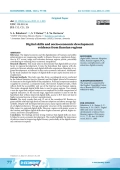Relevance. The digital economy and the digitalization of business and public administration are progressing rapidly in Russia. However, significant disparities in ICT access, usage, and outcomes between regions persist, potentially contributing to widening socio-economic inequalities. Research objective. This study aims to demonstrate that digital skills are a key factor in regional development. It tests the hypothesis that regions with disparities in Internet adoption and digital skills also experience disparities in regional development, as reflected in key socio-economic indicators. Additionally, the study analyzes the impact of digital skills on per capita income and unemployment. Data and methods. The study uses data from a sociological survey conducted by the Federal Statistics Service (Rosstat) and the Higher School of Economics to characterize the digital skills of the population. Principal component analysis is applied to construct a composite index, the Internet Adoption Index, which reflects both the accessibility and use of the Internet across Russian regions. This index, alongside digital skills data, is used to group regions. Two-sample t-tests for equal and unequal variances are employed for initial comparisons of regional indicators. In the second stage, regression analysis is used to test the hypothesis that without improved digital skills, access to ICT does not lead to higher personal income or lower unemployment. Results. The study reveals that only 12 out of the considered 83 Russian regions exhibit relatively high levels of Internet adoption and above-average digital skills. Despite well-developed infrastructure, many regions still have low levels of digital proficiency. The age and gender structure of the population have little impact on regional digital skills. However, regions with greater access to the Internet and higher digital skills show higher economic growth, higher incomes, and lower unemployment. Conclusion. The findings provide strong evidence that digital skills are closely linked to socio-economic development. The results highlight the importance of policies aimed at improving digital literacy, particularly as the digital economy continues to expand.
